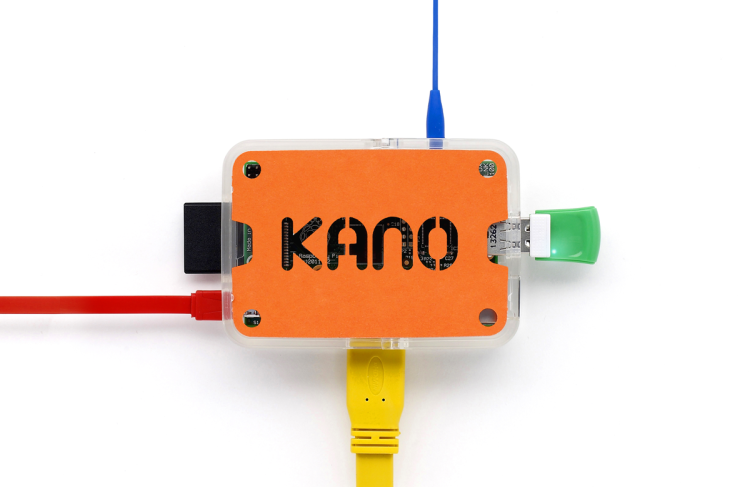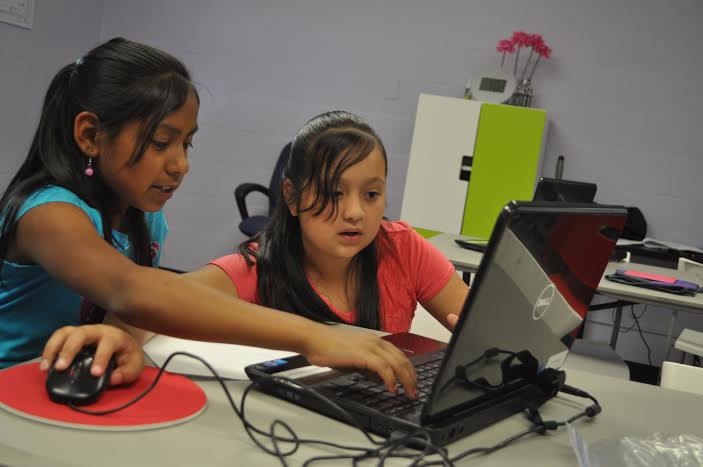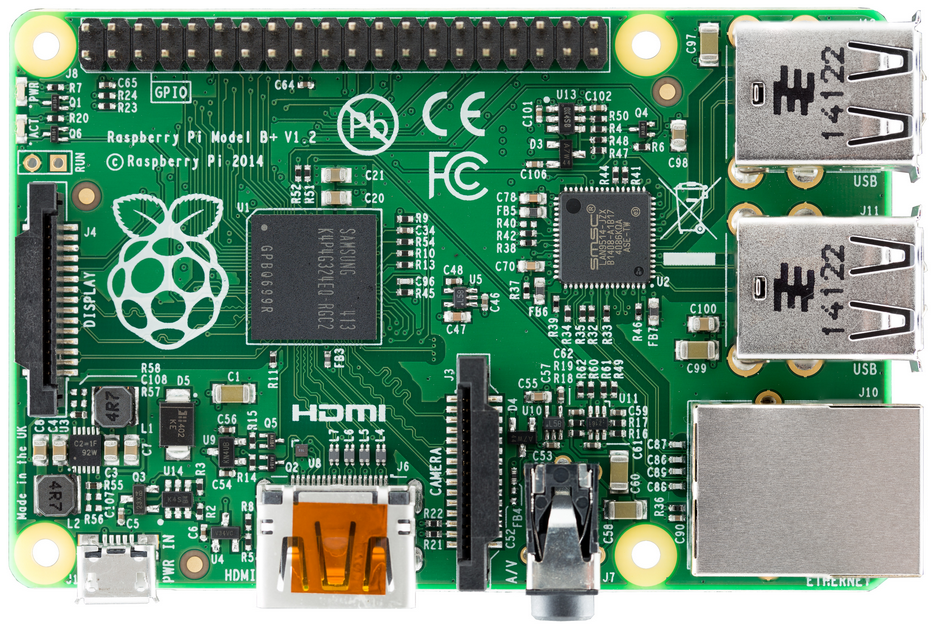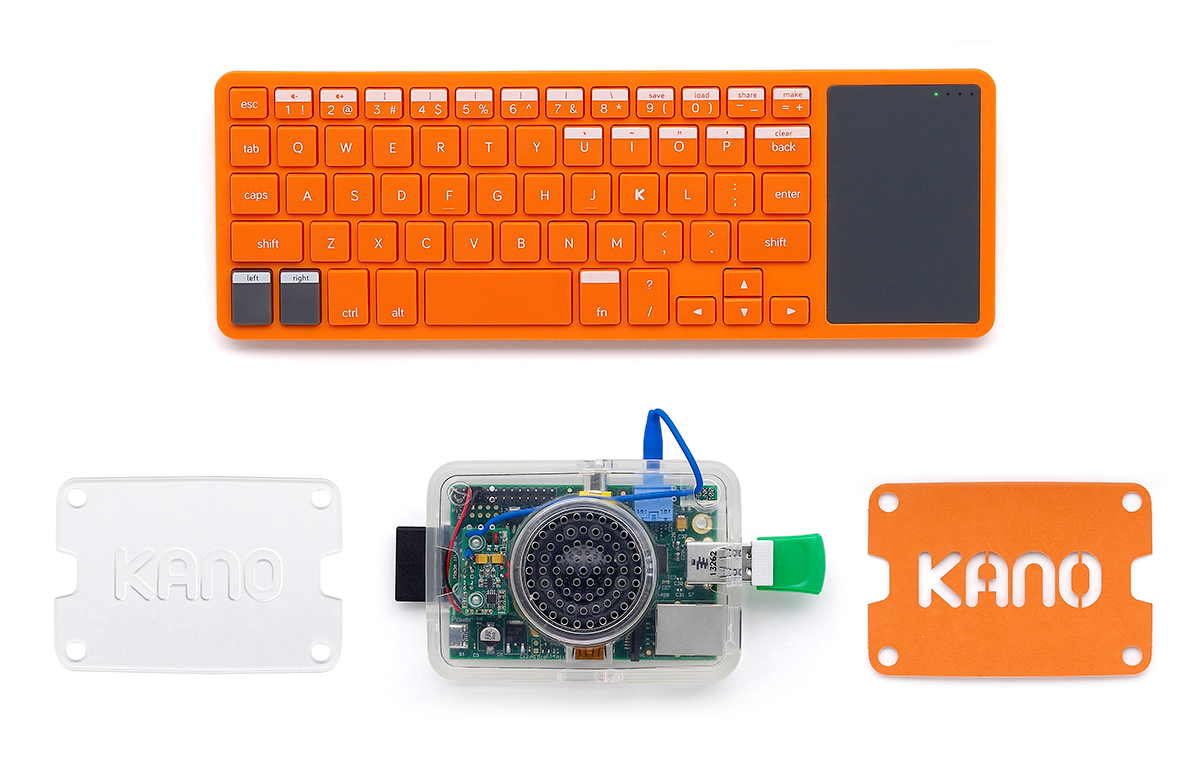There’s a new weapon in the fight to keep kids engaged in computer science — a tiny single-board computer from the U.K. called Kano.
Kano’s the brainchild of Alex Klein, whose young cousin Mika challenged him to create a computer that he could build like Lego. Following an incredibly successful Kickstarter campaign — targeting $100,000 in one month, it raised over $1.5M — Kano shipped its first 20,000 units last October. The $150 kit has been received with joy by kids and adults across 86 countries. Some kids are so attached they’ve even been taking their Kanos to bed with them, like a high tech teddy bear.
Girlstart — an Austin, Texas-based charity that helps inspire underprivileged girls to pursue a STEM (science, technology, engineering, and math) education — is ready to start using Kano in some of its in-demand school clubs and summer camps. With an initial order of 40 Kano kits on the way, it’s bringing a U.K. invention to bear on a U.S. education system that’s under-serving girls when it comes to STEM.
I caught up with Girlstart’s executive director, Tamara Hudgins, and Alex Klein to find out how they’re helping inspire a new generation of inventors, coders, and free-thinkers.
Giving STEM a chance
When Tamara Hudgins joined Girlstart back in the Fall of 2009, it was delivering an after-school program to high-need girls in four Austin, Texas schools. Today, it’s the largest after-school club of its kind in the U.S., working in 52 schools and ready to replicate the model — based on offering inspirational role-models and dynamic, creative STEM opportunities — across the country, alongside its successful summer camps.
Supporting computer science is a large part of Girlstart’s remit — it even started specialist computer science after-school clubs after being approached by Google “Every girl that comes to our summer camp program will make a fully playable video game,” said Hudgins. “We also do app development, 3D design, 3D printing, and of course, robotics.”
The girls joining Girlstart’s after-school clubs are mostly from high-need communities. 80 percent are non-white and more than 75 percent are on free or reduced school lunches. “Our programs are not for geeks, and its not remedial,” says Hudgins. “It’s for girls that are in the middle that are very likely to lose interest in STEM.”
Girlstart grabs these girls’ attention and inspires them by offering something they don’t get in school.
“Girlstart programs are very sticky,” said Hudgins. “It’s not just the what of what we do; it’s the how. The program leader is not wearing a suit, she doesn’t look like a teacher. She’s wearing a Girlstart T-shirt, she’s bubbly and friendly, and the girls can see that she’s like a bigger sister — ‘Oh, I could be like her …’”
And the ideas the girls come up with, when given the freedom and encouragement to be creative, are often incredible.
Hudgins explained that Girlstart girls designed an app for finding a free parking space back in 2007. The same kind of app that’s all over the Google Play and iOS app stores today.
“It’s not at all surprising to me that girls want to take on very audacious challenges because they don’t see the practical barriers to those types of ideas,” said Hudgins. “That gives us reason to believe that if you give girls the right tools — if you frame your program in the right way — you can keep girls interested in STEM, and you can really dramatically impact the STEM workforce.”
Rasberry Pi vs. Kano
Kano is a complete kit that lets kids build their own computer. At its core, though, is a Rasberry Pi — the $25 single-board computer that launched to big acclaim back in 2012, but left lots of kids (and their well-meaning parents) scratching their heads once they’d got it out the box.
“We love the Rasberry Pi,” said Klein, explaining how he’d once engineered a meeting with its inventor Eben Upton.
“They were really the the first genie out of the bottle for single-board computing. They thought they’d sell a couple of thousands of units — they’ve sold millions.”
But the initial enthusiasm didn’t translate to kids staying involved in the Pi community. “The people doing the projects — the people sending it into space, turning it into an autonomous submarine — were mostly 44-plus-year-old men who already knew how to code,” says Klein. “They were already developers.”
“Thousand and thousands of parents bought their kids Pis, but after they arrived, they were a bit lost for what to do next,” he explained. “The Dummies Guide to Rasberry Pi was over 400 pages long — tiny text, black and white pictures.”
So Klein took what’s great about the Rasberry Pi — the affordability, the hackability, and the creative freedom — and wrapped it in Kano’s own, appealing, open-source operating system. As a result, Kano makes the Rasberry Pi feel less like a daunting challenge and more like a creative opportunity. “Our only goal at Kano is to open up its power and its promise to more people,” said Klein.
For Hudgins, the Rasberry Pi was great in principle but hard to use effectively. “I think there are more schools outside of the U.S. that are using it effectively than inside the U.S.,” she said. “In the U.S., we don’t really understand how to assemble that kind of thing. That’s why the Kano was so exciting for me to see.”
“It’s like unwrapping a present,” explained Hudgins, describing how the kit’s design neatly leads kids as they piece it together.
Kano was actually the first Kickstarter project that Hudgins personally backed.
“I was like, ‘You know what? That could be perfect for our girls,’” said Hudgins. “It’s a very, very friendly device. I really am looking forward to the things that girls do with it because it absolutely does provide for a true computer science experience. At the same time, it meets girls where they are.”
And that’s the secret for engaging girls in STEM, according to Hudgins: “If you meet girls where they are, they’re perfectly happy to take on significant, meaningful, crazy challenges. If you swap out the word designer and engineer, you’ll get girls interested nine times out of nine.”





